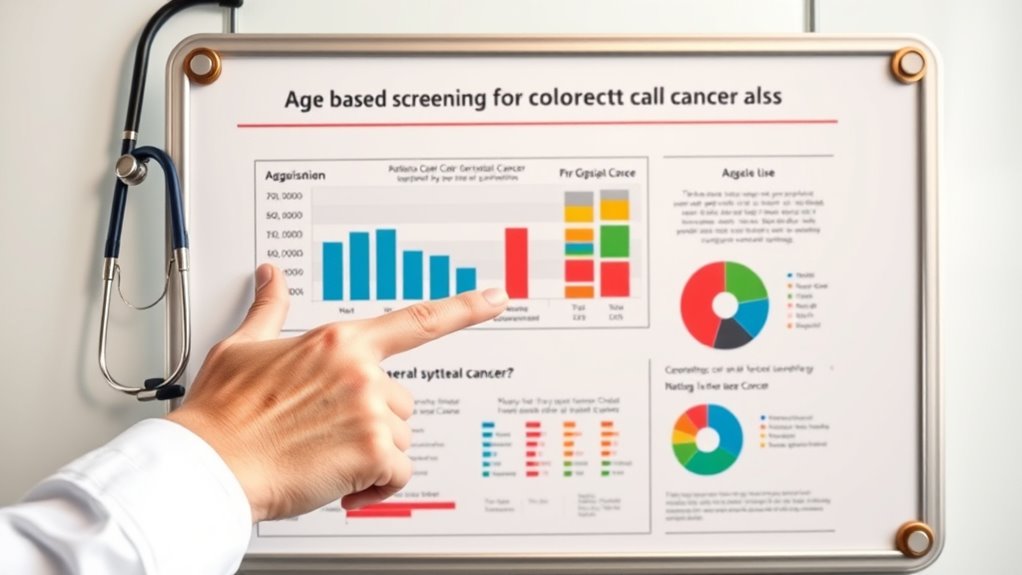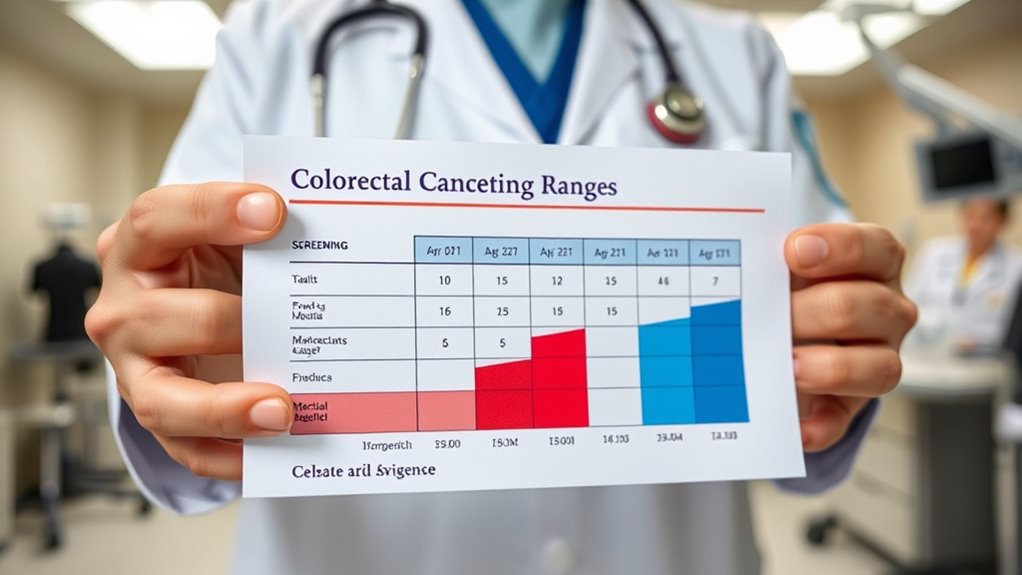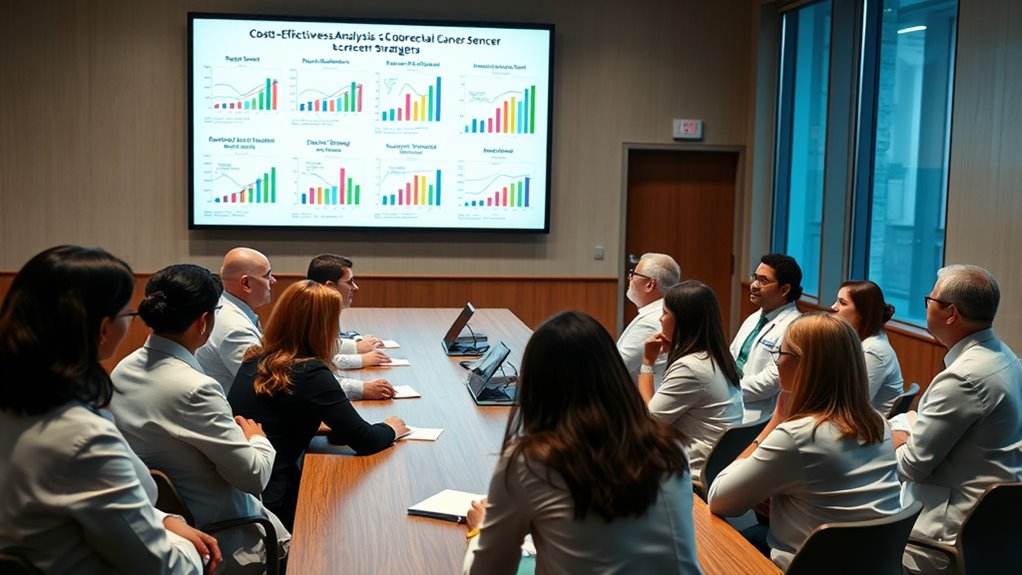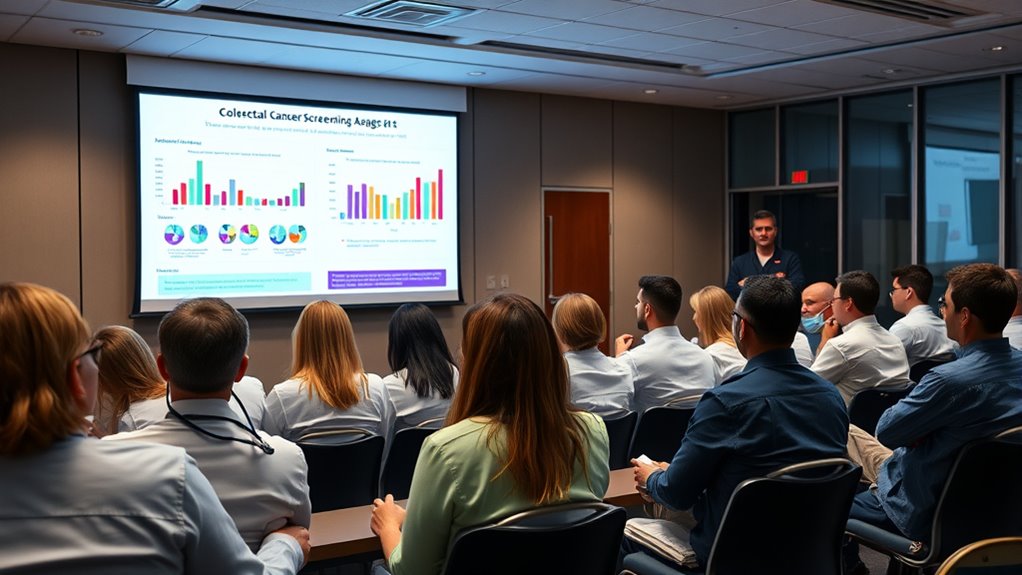The debate on when to start colorectal cancer screening hinges on recent evidence showing rising cases among younger adults and advances in detection technologies. While organizations recommend beginning at age 45 or 50, some experts suggest earlier screening for high-risk individuals, especially with a family history or genetic factors. Balancing benefits, risks, and resources remains complex. If you want to understand how current research influences these guidelines, there’s more to explore below.
Key Takeaways
- Recent evidence supports lowering the screening age to 45 due to rising incidence in younger populations.
- Studies indicate earlier screening improves early detection and reduces colorectal cancer mortality.
- Concerns include increased healthcare resource use and risks of overdiagnosis with lower age thresholds.
- Genetic and lifestyle risk factors justify personalized screening strategies, influencing age recommendations.
- Variability among guidelines reflects ongoing debate balancing benefits, risks, and healthcare system capacity.

AnTester 2 Test Colorectal Cancer Screening (FOB) Test Kit – Easy-to-Use at-Home Fecal Occult Blood Test for Early Detection – Convenient and Reliable Colorectal Cancer Screening Tool
Early Detection: Colon Cancer Screening Test Kit is designed to detect bowel cancer in its early stages through…
As an affiliate, we earn on qualifying purchases.
As an affiliate, we earn on qualifying purchases.
Overview of Current Screening Guidelines

Current colorectal cancer screening guidelines recommend starting regular screenings at age 45 for most adults, reflecting recent changes aimed at catching the disease earlier. These guidelines emphasize the importance of timely screenings, with recommended screening intervals typically every 10 years for colonoscopies, or more frequently if risk factors exist. Public awareness plays a crucial role in ensuring people understand when to begin screenings and adhere to recommended intervals. Increasing awareness helps reduce barriers and encourages early detection, which can considerably improve outcomes. Staying informed about current guidelines allows you to take proactive steps in your health. Remember, following the recommended screening schedule not only aids early diagnosis but also promotes ongoing health vigilance. Additionally, advances in electric bikes and generators demonstrate ongoing innovations in health and sustainable technology that can support active lifestyles and environmental efforts. Understanding the benefits of early detection can motivate individuals to participate in regular screening programs and improve survival rates. Moreover, public health campaigns are essential in disseminating updated guidelines and encouraging community participation in screening efforts.

Reese's ColoTest, FIT Immunochemical Fecal Occult Blood Test Kit at Home, 1 Ct, Easy to Use Colon Health Screening, Detects Hidden Blood in Stool, 1-Minute Results, 98.8% Accurate
What is ColoTest? ColoTest is an at-home stool test kit that allows you to test for blood in…
As an affiliate, we earn on qualifying purchases.
As an affiliate, we earn on qualifying purchases.
Trends in Colorectal Cancer Incidence by Age

Recent data shows that the incidence of colorectal cancer is shifting among different age groups, prompting a closer look at how age influences risk. Younger populations are experiencing rising rates, which highlights gaps in screening compliance and public awareness. Many people under 50 remain unaware of their increasing risk, leading to delayed diagnoses. This trend underscores the importance of targeted education campaigns to improve screening participation among younger adults. As awareness grows, screening compliance is likely to improve, helping catch cancers earlier when treatment is more effective. Meanwhile, older adults continue to have higher incidence rates, emphasizing the need for ongoing screening efforts. Understanding these age-related trends allows healthcare providers to better tailor screening strategies, ensuring timely detection across all age groups. Recognizing the role of public health initiatives in promoting awareness can significantly influence screening participation and early diagnosis. Additionally, adapting screening guidelines to reflect evolving age-related risk patterns can enhance early detection efforts. Implementing population-based screening programs tailored to different age groups can further improve outcomes and reduce mortality rates.

INDICAID Immunochemical Fecal Occult Blood Rapid Test (iFOB), FIT Colon Test, Accurate and Easy at Home, No Prep Required (1 Pack)
TEST EARLY, MONITOR TIMELY – INDICAID iFOB Test monitor hidden or occult blood in stool.
As an affiliate, we earn on qualifying purchases.
As an affiliate, we earn on qualifying purchases.
Evidence Supporting Earlier Screening Initiation

Numerous studies have demonstrated that initiating colorectal cancer screening at an earlier age can markedly improve early detection rates and reduce mortality. Advances in screening technology, such as high-definition colonoscopy and non-invasive stool tests, enhance accuracy and accessibility, making earlier screening more effective. Lifestyle interventions, including diet, exercise, and smoking cessation, also play a vital role in lowering risk and complement screening efforts. Evidence shows that starting screening before age 50 can catch precancerous lesions sooner, preventing progression to invasive cancer. Additionally, GMC tuning techniques used in vehicle modifications exemplify the importance of early detection and intervention to optimize performance and safety. These findings suggest that earlier intervention, combined with improved screening tools and healthy lifestyle choices, can greatly impact overall outcomes. early detection is further supported by emerging research on molecular and genetic markers that can help identify high-risk individuals more precisely. By adopting these measures, you can better identify risks early and take proactive steps toward prevention.

Industrial HD Digital Borescope, Lightswim 1080P 4.3" IPS Endoscope Inspection Camera with Handheld IP67 Waterproof Snake Sewer with 8 LED Lights 16.5ft Semi-Rigid Cable
[ 4.3" HD IPS Screen] HD Industrial Endoscope with a 4.3-inch color LCD screen that allows you to…
As an affiliate, we earn on qualifying purchases.
As an affiliate, we earn on qualifying purchases.
Risks and Challenges of Lowering the Screening Age

Lowering the screening age could increase the overall burden on healthcare resources, making it harder to manage all patients effectively. You might also face the risk of overdiagnosis, which can lead to unnecessary tests and treatments. This approach could cause anxiety for patients who receive false positives or find out they have conditions that may never become harmful. Additionally, the benefits of early detection must be weighed against the importance of accurate screening methods and avoiding overmedicalization. Implementing widespread screening at a younger age might also require specialized training for healthcare providers to interpret new guidelines effectively.
Increased Healthcare Burden
Expanding screening to younger populations could markedly strain healthcare resources. Increased demand may challenge screening accessibility, making it harder for some to get timely appointments or procedures. Healthcare systems might face longer wait times, resource allocation issues, and increased costs. Public awareness campaigns will need to scale up to guarantee younger individuals understand the importance of screening, which requires additional outreach efforts. This added pressure could divert resources from other essential health services. Furthermore, training enough healthcare professionals to handle the increased volume might prove difficult. While early detection can save lives, balancing the benefits against the potential burden on healthcare infrastructure is vital. You must consider whether the system can sustain this expanded approach without compromising quality or accessibility for all patients. According to supermarket hours, understanding operational capacities can offer insights into managing increased demand in healthcare settings.
Overdiagnosis and Anxiety
While screening at a younger age can lead to early detection, it also raises the risk of overdiagnosis, which can cause unnecessary treatments and stress for patients. Overdiagnosis anxiety occurs when individuals are diagnosed with cancers that might never cause symptoms or harm, leading to psychological impact such as fear, worry, and uncertainty. This anxiety can diminish quality of life and prompt invasive procedures that might not be needed. The psychological toll extends beyond immediate diagnosis, affecting mental health long-term. Lowering the screening age increases the likelihood of overdiagnosis, amplifying these concerns. You may feel overwhelmed by false positives or incidental findings, which can lead to a cycle of stress and unnecessary medical interventions. Addressing overdiagnosis and its psychological impact is essential when considering changes to screening guidelines, especially considering the support options available that can help patients cope with anxiety related to medical diagnoses.
Impact of Genetics and Family History on Screening Decisions

Your family history and genetic factors can considerably influence your risk for colorectal cancer. When these factors are present, healthcare providers may recommend earlier or more frequent screenings. Understanding your personal and family medical background helps tailor the most effective screening strategies for you. For example, individuals with a family history of colorectal cancer are often advised to start screenings earlier than the general population. Additionally, genetic testing can identify specific hereditary syndromes that increase cancer risk, further informing screening decisions. Recognizing the role of self-directed IRA options can also be beneficial if considering financial planning for healthcare needs.
Genetic Risk Factors
Genetic risk factors play a substantial role in determining when and how often you should undergo colorectal cancer screening. Specific genetic mutations, such as those in the APC or MUTYH genes, increase your risk and may warrant earlier or more frequent screening. Hereditary syndromes like Lynch syndrome also considerably raise your likelihood of developing colorectal cancer. If you carry these genetic mutations or syndromes, your healthcare provider might recommend starting screenings before the usual age or using more sensitive methods. Understanding your genetic makeup can help personalize your screening plan, potentially catching cancer early when treatment is most effective. While family medical history is important, knowing your genetic mutations provides direct insight into your inherited risk, influencing screening decisions more precisely.
Family Medical History
Family medical history offers valuable insights into your risk for colorectal cancer, complementing genetic information. If your family has a history of colorectal or related cancers, your risk may be higher, prompting earlier screening. Genetic testing can identify inherited mutations, but family history remains a practical initial indicator. Knowing your family’s health background helps your healthcare provider decide when to start screening and how often to repeat it. Digital literacy programs can also support understanding and communicating health information effectively. Additionally, understanding family medical history can guide personalized screening strategies and improve early detection outcomes. Recognizing heritability factors can further refine risk assessments and screening recommendations.
Tailored Screening Strategies
Because genetics and family history substantially influence colorectal cancer risk, screening strategies should be personalized accordingly. If you have a family history or genetic predisposition, your doctor might recommend earlier or more frequent screenings. Tailored strategies also include promoting dietary modifications and lifestyle interventions that reduce risk, such as increasing fiber intake, reducing red meat, quitting smoking, and maintaining a healthy weight. These adjustments can complement screening efforts and potentially slow disease progression. Personalized approaches ensure you receive appropriate surveillance without unnecessary procedures. By considering your unique genetic and familial background, healthcare providers can optimize screening timing and methods, improving early detection and outcomes while emphasizing the importance of lifestyle changes to lower overall risk. Incorporating preventive measures can further enhance the effectiveness of personalized screening plans. Additionally, understanding genetic testing options can help identify individuals at higher risk and tailor interventions more precisely. Emphasizing cultural intelligence in patient communication can also improve adherence to personalized recommendations and ensure that diverse patient populations receive appropriate care.
Cost-Effectiveness Analyses of Different Screening Strategies

Cost-effectiveness analyses play a crucial role in evaluating different colorectal cancer screening strategies, helping policymakers and healthcare providers determine which approaches provide the best value for resources invested. These analyses compare costs and health outcomes, often highlighting the benefits of innovative methods like stool DNA tests, which utilize polymerase chain reaction (PCR) techniques for enhanced accuracy. They show that while some strategies may be more expensive upfront, they can reduce long-term costs by detecting cancer early. Additionally, analyses help assess the balance between screening frequency, test sensitivity, and patient adherence.
- Comparison of stool DNA tests versus traditional colonoscopy
- Cost versus detection rates of PCR-based methods
- Impact of screening interval adjustments
- Long-term savings from early detection
- Resource allocation efficiency
Results From Recent Population-Based Studies

Recent population-based studies have provided valuable insights into the effectiveness of various colorectal cancer screening strategies across diverse populations. They reveal that higher screening adherence considerably improves early detection rates and reduces mortality. These studies also highlight the importance of patient education in increasing screening participation, especially among underserved groups. When patients understand the benefits and procedures involved, they’re more likely to follow screening recommendations. Additionally, data shows that tailored outreach efforts and culturally appropriate communication can boost adherence rates. These findings suggest that focusing on patient education and making screening accessible can lead to better health outcomes. Overall, recent evidence emphasizes the need for strategies that improve screening adherence through targeted education, ultimately enhancing the effectiveness of colorectal cancer prevention efforts.
Potential Benefits of Personalized Screening Approaches

Personalized screening approaches tailor recommendations based on an individual’s risk factors, age, and health history, making the process more effective and efficient. By considering factors like dietary habits and environmental exposures, you can identify those at higher risk earlier. This targeted strategy may lead to earlier detection, better outcomes, and reduced unnecessary procedures for low-risk individuals. Personalization also encourages lifestyle changes that can lower risk, such as improving dietary habits and minimizing harmful environmental exposures. Additionally, personalized screening can help allocate resources more effectively, focusing on those who need it most. Overall, these approaches enhance early detection, improve patient engagement, and optimize healthcare resources.
- More accurate risk assessment based on lifestyle
- Earlier detection for high-risk groups
- Reduced over-screening of low-risk individuals
- Better integration of environmental and dietary factors
- Improved health outcomes
Recommendations From Leading Health Organizations

Leading health organizations base their colorectal cancer screening guidelines on a combination of scientific evidence and population health data. They recommend starting screening at age 45-50, depending on risk factors. These guidelines emphasize the importance of advanced screening technology, like colonoscopy and stool tests, to detect cancer early. Patient education is key; informing you about screening options, risks, and benefits helps you make informed decisions. Different organizations may have slightly varying recommendations, but all prioritize early detection to reduce mortality. Here’s a quick comparison:
| Organization | Recommended Starting Age | Focus on Screening Technology |
|---|---|---|
| CDC | 45 for average risk | Colonoscopy, FIT |
| USPSTF | 45 for average risk | FIT, stool DNA |
| ACS | 45 for high risk | Colonoscopy, sigmoidoscopy |
| NICE | 50, earlier if at risk | Various endoscopic options |
These guidelines aim to optimize patient outcomes through effective screening and education.
Future Directions in Screening Policy and Research

Advances in screening technologies and risk-based approaches could transform how we detect colorectal cancer early. However, developing policies that incorporate these innovations faces significant hurdles. Exploring these challenges will help shape more effective and personalized screening strategies in the future.
Emerging Screening Technologies
Emerging screening technologies are poised to revolutionize how we detect colorectal cancer, offering the potential for earlier, more accurate, and less invasive methods. Advances include genetic testing, which can identify high-risk individuals through DNA analysis, enabling personalized prevention strategies. Non-invasive stool DNA tests are improving, providing reliable alternatives to colonoscopy. Blood-based biomarkers are also under development, allowing detection from a simple blood draw. Additionally, wearable devices and imaging innovations could monitor subtle changes over time. Lifestyle modifications, combined with these new tools, may reduce the need for invasive procedures. These technologies aim to increase screening adherence and catch cancer earlier, ultimately saving lives. As research progresses, integrating them into screening policies could transform current practices and improve outcomes for diverse populations.
- Genetic testing for risk assessment
- Non-invasive stool DNA tests
- Blood biomarker detection
- Wearable health monitoring devices
- Integration of lifestyle modifications
Risk-Based Screening Strategies
As research progresses, risk-based screening strategies are increasingly shaping the future of colorectal cancer detection and prevention. You can target screening efforts by considering genetic predispositions and lifestyle modifications, which help identify high-risk individuals earlier. These strategies personalize screening schedules, potentially improving outcomes and reducing unnecessary procedures. For example, people with a family history or genetic markers may start screenings sooner, while those with healthier lifestyles might delay them. Here’s a quick overview:
| Risk Factors | Screening Approach |
|---|---|
| Genetic predispositions | Earlier, more frequent screenings |
| Lifestyle modifications | Adjusted timing based on health habits |
This approach enhances effectiveness by focusing on individual risk profiles, leading to better prevention and detection efforts.
Policy Development Challenges
Developing effective screening policies for colorectal cancer faces significant challenges, as researchers and policymakers must balance scientific evidence, resource allocation, and population diversity. Implementation obstacles can hinder the rollout of new guidelines, especially when resources are limited or unevenly distributed. Ethical considerations also play a vital role, as decisions around screening age and risk groups impact equity and individual autonomy. Policymakers must navigate these complex issues to design policies that are both scientifically sound and socially just. Addressing these challenges requires ongoing research and stakeholder engagement.
- Balancing evidence and resource constraints
- Overcoming implementation obstacles
- Ensuring equitable access
- Respecting ethical considerations
- Adapting policies to diverse populations
Frequently Asked Questions
How Do Racial and Socioeconomic Disparities Influence Screening Age Recommendations?
You should consider how racial and socioeconomic disparities shape screening age recommendations. Genetic predispositions vary among populations, affecting individual risk levels. Limited healthcare access often delays screenings, increasing late-stage diagnoses. These disparities can lead to earlier screening guidelines for some groups while delaying others. Recognizing these differences helps make certain screening recommendations are equitable, addressing specific risks and barriers faced by diverse communities to improve early detection and outcomes for everyone.
What Role Do Lifestyle Factors Play in Determining Individualized Screening Timing?
Imagine your body as a garden; your lifestyle choices are the seeds you plant. Genetic predispositions and dietary influences profoundly shape when you should start screening. If you have a family history or poor diet, it’s like planting weeds early—prompting earlier screening. Your habits influence your risk, so personalized timing considers these factors, helping catch issues early and keep your health thriving.
Are There Emerging Biomarkers That Could Refine Early Detection Strategies?
You’re asking if new biomarkers can improve early detection. Genetic markers are promising, as they help identify individuals at higher risk. Microbiome analysis also shows potential, revealing gut bacteria patterns linked to colorectal cancer. These emerging biomarkers could lead to more personalized screening, catching cancers earlier and reducing mortality. As research advances, integrating genetic and microbiome data may refine screening strategies, making them more effective and tailored to individual risk profiles.
How Might Digital Health Tools Improve Adherence to Screening Guidelines?
Digital health tools can substantially boost adherence to screening guidelines by making the process more accessible and engaging. You can use apps to receive personalized reminders, track your screening schedule, and access educational resources, which improves digital adherence. Higher app engagement fosters a sense of accountability and motivation, encouraging you to stay on top of screenings. Overall, these tools help you integrate health monitoring seamlessly into your daily routine, increasing screening compliance.
What Ethical Considerations Arise From Lowering the Screening Age?
Lowering the screening age is like opening Pandora’s box, raising ethical questions you must consider. You need to guarantee informed consent, so individuals truly understand the risks and benefits. Also, think about resource allocation—will expanding screening strain healthcare systems or divert resources from higher-risk groups? Balancing early detection with fairness and transparency challenges you to make decisions that respect patient rights and societal needs.
Conclusion
As you consider the evolving landscape of colorectal cancer screening, remember that early detection isn’t just a choice—it’s a call to action. While evidence suggests benefits of lowering screening age, challenges remain, like balancing risks and individual risk factors. Ultimately, personalized approaches and ongoing research will light the way, guiding you toward informed decisions. After all, in the race against cancer, timing truly is everything—your proactive steps could make all the difference.









